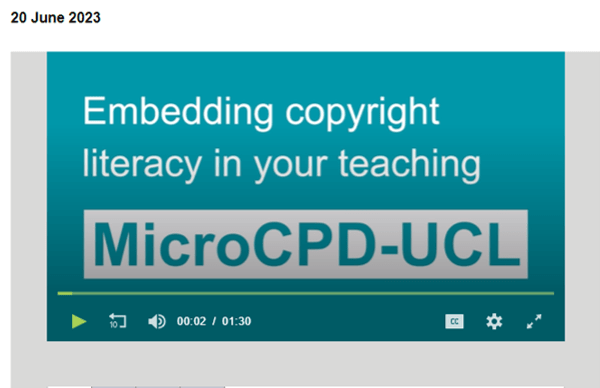Copyright updates, July 2023: tackling copyright anxiety, “giving voice to authors”, and new UCL copyright resources
By Christina Daouti, on 28 July 2023

Image by wayhomestudio on Freepik
Copyright anxiety study seeks to help address ‘copyright chill’
The recently launched Copyright Anxiety Study is a collaboration between the Bodleian Libraries, University of Oxford, City, University of London and the University of Alberta.
The study seeks to gauge copyright anxiety levels among higher education staff in the UK and Canada, with a view to recommend solutions to alleviate this anxiety.
This is an important study, with the potential to help professionals in various higher education roles (library, teaching and research) deal with copyright more confidently.
“Copyright anxiety is not without important consequences. Because many people are unsure what is and what isn’t legal online under copyright, they self-censor, and choose not to post or create things for fear it might land them in serious legal trouble. Ironically, increasingly strong copyright is casting a “chill” that discourages, rather than encourages, creativity. Given the billions of people who are now online, the scale of that creative loss is likely to be massive”. Glyn Moody, Walled Culture website
The survey is open until 18 August 2023. Please complete the survey and share further with colleagues if possible.
For more information on the project, see the copyrightliteracy.org website. Please contact chris.morrison@bodleian.ox.ac.uk if you have any questions about the research.

Image by nikitabuida on Freepik
New project by Authors Alliance and KnowledgeRights21 empowers authors who write for the public benefit.
Authors Alliance and KnowledgeRights21 have launched a new project, ‘Giving Voice to Authors‘, to support European authors (primarily academics but also journalists and authors of fiction and non-fiction), who want their works to be widely accessible and discoverable.
Authors Alliance has members from all over the world. Its main objective is to promote the rights of authors who support open and equitable access to knowledge and ensure they have a voice in current policy debates. Knowledge Rights 21 (KR21) is a 3-year programme that advocates long-term copyright reform for the benefit of library users and researchers.
Authors Alliance welcomes any authors who want to add their voices to these debates. You can join for free at www.authorsalliance.org/join.
AA website: https://www.authorsalliance.org/2023/07/20/authors-alliance-in-europe-giving-voice-to-authors/
KR21 website: https://www.knowledgerights21.org/news-story/knowledgerights21-to-work-with-authors-alliance-to-raise-the-voice-of-authors-who-care-about-the-public-interest/
New UCL copyright resources: microCPD video and new website guidance on copyright to research data, code and publications
The LCCOS copyright team has developed a micro-CPD encouraging lecturers to embed copyright knowledge in their teaching.
Increasing students’ understanding of copyright gives them research and information skills that will help them beyond University, supports their creativity and helps teaching staff protect the integrity of their own materials.
The 90-sec video is part of the UCL Arena series, aiming to promote best practice for teaching staff in a concise format.
Please also see our two new pages on
Copyright and your research publications, including information on ownership, publishing agreements and your rights as authors
Copyright for research data and software, including guidance on ownership and licensing.
If you have any questions, please contact copyright@ucl.ac.uk.
 Close
Close





